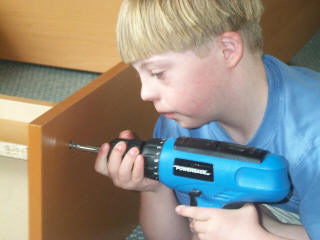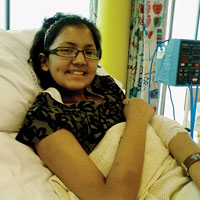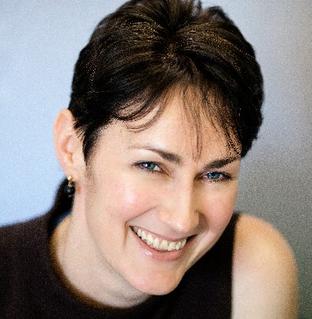
A genetic disorder is a health problem caused by one or more abnormalities in the genome. It can be caused by a mutation in a single gene (monogenic) or multiple genes (polygenic) or by a chromosomal abnormality. Although polygenic disorders are the most common, the term is mostly used when discussing disorders with a single genetic cause, either in a gene or chromosome. The mutation responsible can occur spontaneously before embryonic development, or it can be inherited from two parents who are carriers of a faulty gene or from a parent with the disorder. When the genetic disorder is inherited from one or both parents, it is also classified as a hereditary disease. Some disorders are caused by a mutation on the X chromosome and have X-linked inheritance. Very few disorders are inherited on the Y chromosome or mitochondrial DNA.
A telethon is a televised fundraising event that lasts many hours or even days, the purpose of which is to raise money for a charitable, political or other purportedly worthy cause.

Cancer Research UK (CRUK) is the world's largest independent cancer research organisation. It is registered as a charity in the United Kingdom and Isle of Man, and was formed on 4 February 2002 by the merger of The Cancer Research Campaign and the Imperial Cancer Research Fund. Cancer Research UK conducts research using both its own staff and grant-funded researchers. It also provides information about cancer and runs campaigns aimed at raising awareness and influencing public policy.

Great Ormond Street Hospital is a children's hospital located in the Bloomsbury area of the London Borough of Camden, and a part of Great Ormond Street Hospital for Children NHS Foundation Trust.
Muscular Dystrophy Association (MDA) is an American nonprofit organization dedicated to supporting people living with muscular dystrophy, ALS, and related neuromuscular diseases. Founded in 1950 by Paul Cohen, who lived with muscular dystrophy, MDA accelerates research, advances care, and works to empower families to live longer and more independent lives. Renowned for The MDA Labor Day Telethon, the annual telecast aired live from 1966 to 2010 and was hosted by Jerry Lewis, who also served as MDA's national chairman.

Fundraising or fund-raising is the process of seeking and gathering voluntary financial contributions by engaging individuals, businesses, charitable foundations, or governmental agencies. Although fundraising typically refers to efforts to gather money for non-profit organizations, it is sometimes used to refer to the identification and solicitation of investors or other sources of capital for for-profit enterprises.
Kirsty Ellen Howard was an English children's hospice advocate known for her fundraising efforts for Francis House Children's Hospice in Didsbury, Manchester. As a patient of the hospice, Howard was the figurehead of the Kirsty's Club, a charity dedicated for fundraising for the facility, which was severely underfunded at the time. Her efforts gained national support and attention. At the time of her death, she had raised over £7.5 million for the hospice.
The Cystic Fibrosis Trust is a UK-based national charity founded in 1964, dealing with all aspects of cystic fibrosis (CF). It funds research to treat and cure CF and aims to ensure appropriate clinical care and support for people with cystic fibrosis.

Teenage Cancer Trust is a cancer care and support charity in the UK that exists to improve the cancer experience of young people aged 13–24. Founded in 1990, the charity's key service is providing specialist teenage units in NHS hospitals. It also trains and funds staff who are teenage cancer specialists. The units are dedicated areas for teenage and young adult patients, who are involved in their concept and creation. Medical facilities on the units are equipped with computers, TVs and game consoles.

Medical genetics is the branch of medicine that involves the diagnosis and management of hereditary disorders. Medical genetics differs from human genetics in that human genetics is a field of scientific research that may or may not apply to medicine, while medical genetics refers to the application of genetics to medical care. For example, research on the causes and inheritance of genetic disorders would be considered within both human genetics and medical genetics, while the diagnosis, management, and counselling people with genetic disorders would be considered part of medical genetics.
Children's Medical Research Institute (CMRI) is an Australian medical research institute located in Westmead that conducts research into children's genetic diseases. As of 2019, current research is focused on cancer, birth defects, neurological conditions such as epilepsy, and gene therapy.
The Channel Seven Perth Telethon, regionally known simply as Telethon, is an annual telethon established in 1968 by philanthropist Sir James Cruthers and Brian Treasure, and produced by TVW, a Seven Network-owned television station in Perth, Western Australia. It raises money for over 50 beneficiaries each year including the Perth Children's Hospital, the Telethon Clinical Research Centre and the Telethon Kids Institute. Channel Seven's Perth Telethon is the highest donating telethon per capita in the world, and since the first Telethon in 1968 has raised over A$500 million in total.
The Nuffield Council on Bioethics is a UK-based independent charitable body, which examines and reports on bioethical issues raised by new advances in biological and medical research. Established in 1991, the Council is funded by the Nuffield Foundation, the Medical Research Council and the Wellcome Trust. The Council has been described by the media as a 'leading ethics watchdog', which 'never shrinks from the unthinkable'.
Mitochondrial replacement therapy (MRT), sometimes called mitochondrial donation, is the replacement of mitochondria in one or more cells to prevent or ameliorate disease. MRT originated as a special form of in vitro fertilisation in which some or all of the future baby's mitochondrial DNA (mtDNA) comes from a third party. This technique is used in cases when mothers carry genes for mitochondrial diseases. The therapy is approved for use in the United Kingdom. A second application is to use autologous mitochondria to replace mitochondria in damaged tissue to restore the tissue to a functional state. This has been used in clinical research in the United States to treat cardiac-compromised newborns.

Devaanshi Mehta was a British - Indian student and humanitarian. She started the Asian Donor Campaign (ADC), a UK-based non-profit organisation whose goal is to raise awareness for the need to get more Asians to donate their blood, bone marrow and organs. ADC also raises funds for hospitals doing research into critical and life limiting illnesses.

Richard Cotton AM was an Australian medical researcher and founder of the Murdoch Institute and the Human Variome Project. Cotton focused on the prevention and treatment of genetic disorders and birth defects.

FOP Friends, formerly Friends of Oliver, is a registered charity in the United Kingdom established on 1 March 2012. It aims to raise funds that are needed to find effective treatments for the rare genetic condition fibrodysplasia ossificans progressiva (FOP). The charity also works to raise awareness and understanding of FOP amongst medical communities and the general public.
Robert Williamson is a retired British-Australian molecular biologist who specialised in the mapping, gene identification, and diagnosis of human genetic disorders.

Maria Bitner-Glindzicz was a British medical doctor, honorary consultant in clinical genetics at Great Ormond Street Hospital, and a professor of human and molecular genetics at the UCL Institute of Child Health. The hospital described her work as relating to the "genetic causes of deafness in children and therapies that she hoped would one day restore vision." She researched Norrie disease and Usher syndrome, working with charities including Sparks and the Norrie Disease Foundation, and was one of the first colleagues involved in the 100,000 Genomes Project at Genomics England.
Sara Elizabeth Mole Crowley is a Professor of Molecular Cell Biology and Provost's Envoy for Gender Equality at University College London and the Great Ormond Street Hospital. She works on diseases caused by genetic changes, in particular neurodegenerative diseases that impact children.









